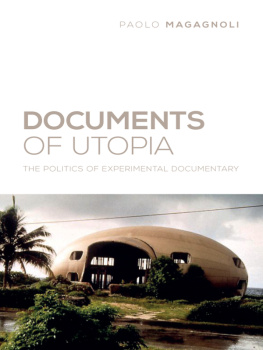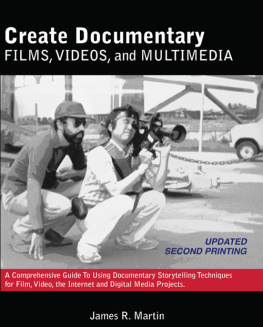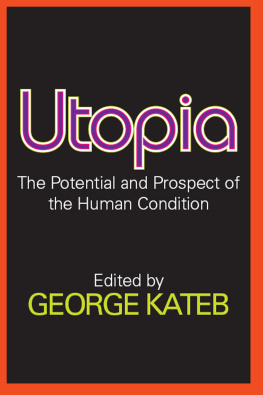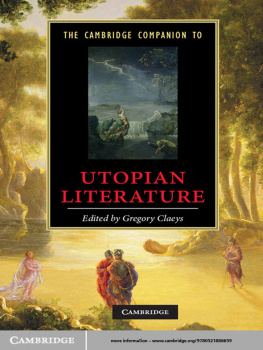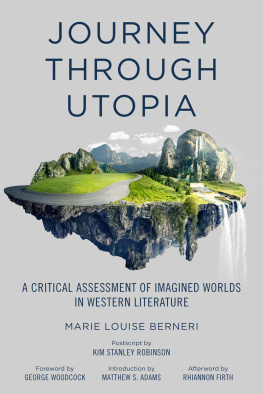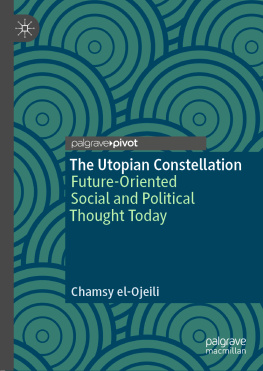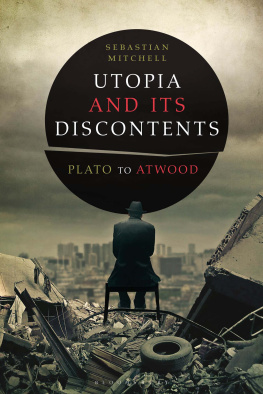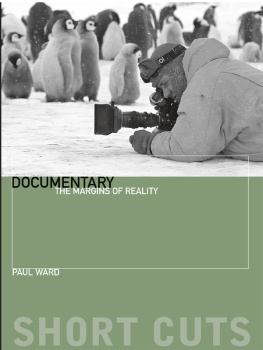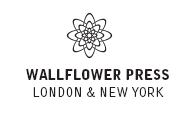DOCUMENTS OF UTOPIA
Nonfictions is dedicated to expanding and deepening the range of contemporary documentary studies. It aims to engage in the theoretical conversation about documentaries, open new areas of scholarship, and recover lost or marginalised histories.
Other titles in the Nonfictions series:
Direct Cinema: Observational Documentary and the Politics of the Sixties
by Dave Saunders
Projecting Migration: Transcultural Documentary Practice
edited by Alan Grossman and Aine OBrien
The Image and the Witness: Trauma, Memory and Visual Culture
edited by Frances Guerin and Roger Hallas
Films of Fact: A History of Science in Documentary Films and Television
by Timothy Boon
Building Bridges: The Cinema of Jean Rouch
edited by Joram ten Brink
Vision On: Film, Television and the Arts in Britain
by John Wyver
Chavez: The Revolution Will Not Be Televised A Case Study of Politics and the Media
by Rod Stoneman
Documentary Display: Re-Viewing Nonfiction Film and Video
by Keith Beattie
The Personal Camera: Subjective Cinema and the Essay Film
by Laura Rascaroli
The Cinema of Me: The Self and Subjectivity in First Person Documentary
by Alisa Lebow
Killer Images: Documentary Film, Memory and the Performance of Violence
edited by Joram ten Brink and Joshua Oppenheimer
Documenting Cityscapes: Urban Change in Contemporary Non-Fiction Film
by Ivn Villarmea lvarez.
DOCUMENTS
OF UTOPIA
THE POLITICS OF EXPERIMENTAL DOCUMENTARY
PAOLO MAGAGNOLI
A Wallflower Press Book
Published by
Columbia University Press
Publishers Since 1893
New York Chichester, West Sussex
cup.columbia.edu
Copyright Columbia University Press 2015
All rights reserved.
E-ISBN 978-0-231-85077-3
Wallflower Press is a registered trademark of Columbia University Press
A Columbia University Press E-book.
CUP would be pleased to hear about your reading experience with this e-book at .
Cover image:
Bubble House (1999)
(Courtesy Tacita Dean and Marian Goodman Galley, New York)
A complete CIP record is available from the Library of Congress
ISBN 978-0-231-17270-7 (cloth : alk. paper)
ISBN 978-0-231-17271-4 (pbk. : alk. paper)
ISBN 978-0-231-85077-3 (e-book)
CONTENTS
This book would have remained a utopian project itself were it not for the support and guidance of numerous individuals over many years. I have a lot of people to thank, and wholeheartedly so, although limitations of space prevent me from being as specific as I would like. My first debt is to TJ Demos, a remarkable teacher and writer who ignited my interest in contemporary art and the conjunction of art and politics, encouraged me to pursue this subject and offered tremendous inspiration, insight and assistance along the way. I am also grateful to Tamar Garb and Briony Fer, whose strength and enthusiasm have been an inspiration for me throughout all my years as a research student at University College London (UCL). I thank Amna Malik of the Slade School of Fine Art at UCL for offering me some constructive criticism on .
I would also like to thank the faculty members of the Department of History of Art at UCL, where a significant part of this research was developed: Diana Dethloff, Natasha Eaton, Mechthild Fend, Charles Ford, Sarah James, Petra-Lange Berndt, Maria H. Loh, Rose Marie San Juan, Stephanie Schwartz, Frederic Schwartz and Alison Wright. Aspects of this book were presented during the course of its preparation at a diverse range of lectures, symposia and conferences, and it always came away better as a result. I am grateful to all of those who have invited me to present my drafts and to all the audiences and participants at these events. A section of benefitted from my participation as a speaker in the conference The Versatile Image: Photography in the Era of Web 2.0, which was held at the University of Sunderland in June 2011 and organised by Alexandra Moschovi and Carol McKay. Also, I would like to convey my gratitude to Margaret Iversen for providing unpublished materials on Zoe Leonard and Tacita Dean.
I also owe a debt of gratitude to the artists whose work is the subject of the book: Anri Sala, Joachim Koester, Hito Steyerl, Ilya and Emilia Kabakov, Zoe Leonard, Rachel Harrison, Richard Vijen, Alison Craighead and Jon Thomson have all been tremendously patient and collaborative over the years of my research. The staff of numerous galleries have been crucial to the research for this project, and I would like to recognise some of them here: Florence Marqueyrol of Galerie Noisy-Le-Sec, Paris; Marie-Laure Gilles at Galerie Chantal Crousel, Paris; Catherine Belloy at Marian Goodman Gallery, New York; Linda Yun at Greene Naftali Gallery, New York; Janice Guy at Murray Guy, New York; Claus Robenhagen at Nicolai Wallner Gallery, Copenhagen; Margherita Molinari at Sprovieri Galley, London; and Annis Fitzhugh and Britta Funck at Dundee Contemporary Arts. I would like to thank Alexandra Lody, Elizabeth Robertson and Julia Crompton, who have painstakingly read every word, correcting my grammatical mistakes and suggesting graceful alternatives to my awkward phrasing. A special thanks goes to Jean Charles-Leyris at the Archive National du Monde du Travail in Roubaix for his help in reconstructing the history of Jean-Luc Moulnes objets de grve.
For friendship, collaboration, conversation and advice of various kinds, in various places and over different periods of time, many thanks are also due to Antonio Costa, Paul Wilson, Peter McNeil, Malcolm Turvey, Richard Dyer, Melissa Gronlund, Andrew Fisher, Alisa Lebow, Matilde Nardelli, Irene Montero Sabin, Denise Frimer, Milena Tomic, Teresa Kittler, Cadence Kinsey, Tom Morgan Evans, Sergio Martins and Margit Neuhold. Many thanks also to my students in London and Sydney, with whom I regularly tested part of this book, for their caring and engaged responses.
My editor, Yoram Allon, at Wallflower Press has been wonderfully supportive since day one and I will always be grateful for his wisdom, experience and wit as this project has progressed. I would also like to thank all the team at Wallflower Press for their efficiency in expertly steering the book to publication.
This book has evolved over a number of years. Part of appeared as Moulne, Rancire and 24 Objets de Grve: Productive Ambivalence or Reifying Opacity? in Philosophy of Photography, vol. 3, no. 1 (2012). A section of the final chapter was published as Capitalism as Creative Destruction: The Representation of the Economic Crisis in Hito Steyerls In Free Fall in Third Text, vol. 27, no. 6 (2013). I am grateful to the publishers and editors of these articles for their permission to reproduce material here.
Finally, thanks to my family and in particular to my partner, Benedetta Brevini, for her continued, unswerving, often undeserved support. Much more importantly, she makes my life better every day. This work is dedicated to her.
Nostalgic memories are histories of the future. Even before I begin to explain that sentence, some readers may feel a nagging concern, for the very term nostalgia is usually understood as the opposite of a positive future or utopia: while utopia is the projection of a better world into the future, nostalgia is a longing for something far away or long ago. Yet there are strong affinities between these two impulses. Like utopia, nostalgia conjures up the image of a society in which the problems that beset our current condition are transcended or resolved; and like utopia, nostalgia may have a critical dimension, as it originates from a feeling of discontent towards the society one lives in. As Linda Hutcheon points out, nostalgic and utopian impulses share a common rejection of the here and now.

